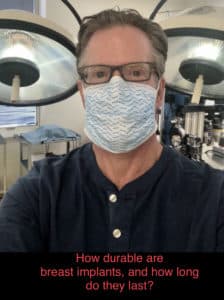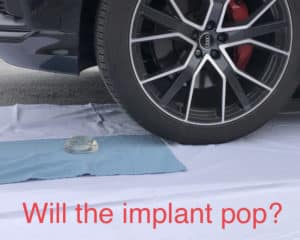Silicone and saline implants are used to give breasts a more natural, full, and attractive appearance. Breast augmentation is one of the most commonly performed cosmetic operations each year. About 350,000 patients get implants each year in America. This is one of my most popular operations and one of my favorite. It is an operation that I specialize in and do extremely frequently. The implants used are incredibly durable, high tech, safe, and natural. But, they don’t last forever. Implants can deflate, pop, or leak. This educational writing and accompanying video will review this topic. It was written at the request of a patient from Philadelphia, PA.
How Long Do Breast implants Last?

The FDA recommends, as do I also, that every woman understands that implants most likely will eventually need to be replaced. As described above, this time frame can be very long. Just as when you buy a brand new car, you understand that eventually it will get old, and you will need to change it for a new one. With cars, this time frame might be just 2-5 years. Breast implants last for much longer time periods, and we eventually consider replacement after ten years.
Medical studies show different rates of deflation. Deflation is the medical word for popping or leaking. Many studies look at 10 years after the operation. Deflation rates are from 1% to 10%. In my experience after thousands of breast surgeries, I quote a 2-5 % deflation rate at ten years.
Many women ask, “I heard you have to replace them at 10 years?” I think the best answer to this question is that you might have to replace them. It’s not that you have to, but that you might have to replace them. Reasons for replacement include deflation, capsular contracture, shape issues, and concern over BII. The number one reason for replacement is the desire to go bigger and to get larger implants. Removing breast implants is called an explant. Please link now for those interested in more information on this topic.
How Durable Are They?
In general, implants are extremely durable. The vast majority do not pop after long periods of time. But nevertheless, they can pop. Reasons for leakage include (but are not limited to) mammograms, trauma, surgery, capsular contracture, and aging of the implant. The implants can actually withstand surprisingly large amounts of force and not pop. This gets me to my durability test that I have videoed. In this video, I show what happens when they are run over by a car and also cut with a knife. I find the video fascinating. I hope you do too. You can link their now by clicking on the picture below.
When Do I Remove or Replace Them?
Once an implant deflates, it is time to have them removed and usually replaced. Implant replacement is a straight forward procedure with high success and low complication rate. If the implant is not deflated, it becomes a question of when do you replace them. There is no set answer to this question. Many doctors will say between 10-20 years.
As I have said above, it’s best to understand that you might have to replace them at some point in the future. But if all is well, you don’t have to. If the implants are soft and everything is healthy, then it’s a decision you make with your doctor. MRI’s can be of help in these situations. Some patients will have silent ruptures with silicone. A silent rupture means it has popped; but you don’t know it, and you are not having problems. The MRI will help in this situation. But unfortunately, it’s expensive and insurance won’t cover it. Most of the time, replacement in this situation is best, and it is performed in a timely fashion. It is not an emergency, because the deflated implant will not harm you.
Is There an Insurance Policy?
I use Mentor implants. I believe they are the best on the market, and they are American made and of the highest quality. They come with a life time insurance package that you are automatically enrolled in. The insurance policy for the patient includes $3500 to cover expenses in the event of deflation for 10 years. The policy also includes a free implant replacement for your lifetime.
What is the Longest Time Implants Have Lasted in a Woman?
The person with the same implants in for the longest time is Timmie Jean Lindsey. She got the silicone implants placed in 1962 by Dr Frank Gerow in Texas. The implants are still in place over 58 years later! She is healthy and so are her breast implants.


